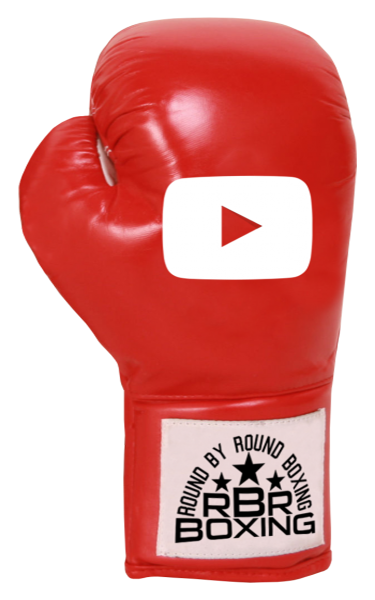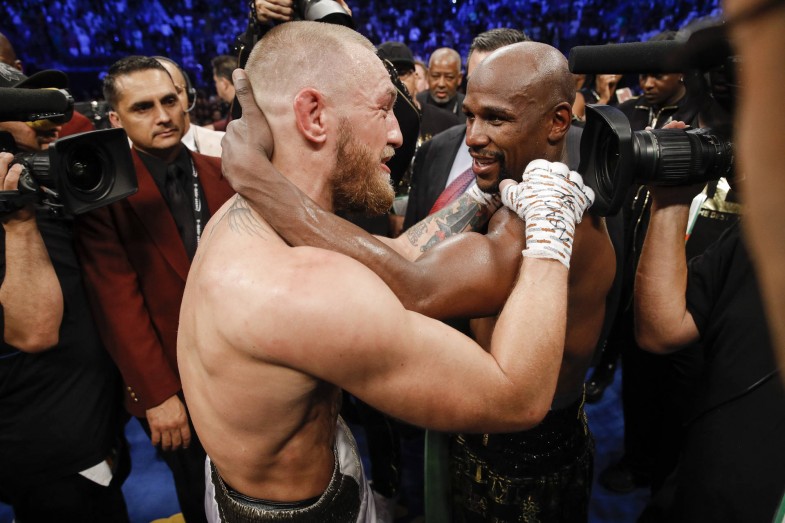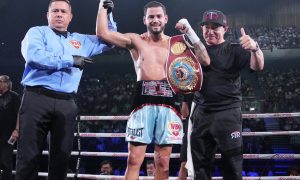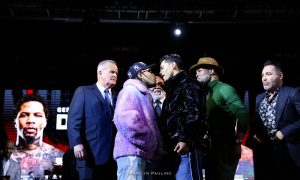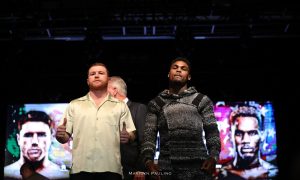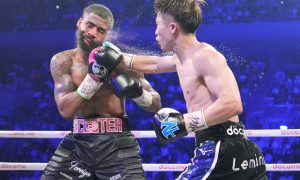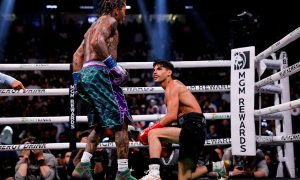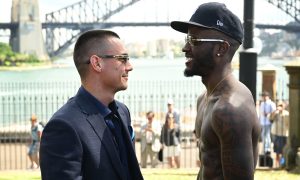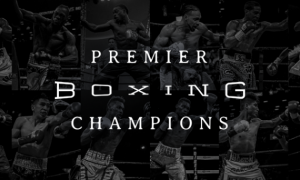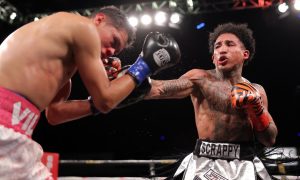Tunneling to China using a teaspoon would be an easier task than boiling down the countless hard luck boxing stories to just ten entries.
While the toothpaste can never be put back into the tube there are things that transpire in life, boxing in this case, that one would reverse given their druthers.
Here are 10 of them, in no particular order or significance. We absolutely welcome and encourage you to share your thoughts in to the comments at the end of the article regarding which moments stand out in your mind.
Which boxing moments would you like to get back?
Larry Holmes vs. Muhammad Ali 10-2-1980
The legend of Muhammad Ali had been written in stone and virtually crossed over to mythical proportions before the end of the 1970’s.
His decision win over Leon Spinks to become the only heavyweight to hold the championship three times was the perfect ending to a career that would be unbelievable had it been created in Hollywood.
Ali’s metaphoric and literal trials, tribulations and multiple renditions of slaying Goliath since turning professional 20 years earlier transformed him into a folk hero of sorts and the People’s Champion worldwide.
Following Muhammad Ali’s retirement, Larry “The Easton Assassin” Holmes claimed the vacant WBC title in an epic clash with former Ali nemesis Ken Norton over 15 scintillating rounds.
Holmes had the unenviable misfortune of cultivating in the considerable shadow of the popular former champion for whom he had once been a sparring partner.
Brandishing one of the greatest jabs in boxing history along with an arsenal of other weapons Holmes was clearly establishing himself the world’s best heavyweight.
The one element that he craved but had not developed, however was the universal love and acceptance held by his predecessor. Holmes was noticeably bothered by this and his efforts of endearment were largely ineffective as he remained underappreciated by both media and fans alike.
A proverbial wrench in to the Holmes machine when the Ali circus returned to town once again, this time to challenge the reigning champion in what would be the eighth defense of his WBC crown.
Ali had slimmed down to 217 pounds, his lightest weight in many years. It was later discovered that this was through use of diuretics as well as an adverse reaction to medication for his Parkinson’s which was not yet correctly diagnosed.
As always, the former champion kept his audience spellbound as he held court and espoused what he had in store for Holmes while cameras whirred and flash bulbs popped.
There was nothing anyone could do for him on this night and Ali appeared sadly and utterly helpless as Holmes completely dominated the proud former champion. What ensued was as heart wrenching as watching Santa Clause get curb stomped for 10 rounds.
Ali’s trainer Angelo Dundee mercifully stopped the massacre in the corner between rounds though the emotion of the evening was permanently impressed on those who witnessed.
Billy Collins Jr. vs. Luis Resto 6-16-1983
It is no small evening for an undefeated contender to be the co-feature at the legendary Madison Square Garden; an impressive victory on such a stage would certainly advance young ambitions.
This is exactly how it started for “Irish” Billy Collins Jr. (14-0, 11Kos) when he slipped between the ropes on the undercard for Roberto Duran v Davey Moore fight for Moore’s title.
His opponent was Luis Resto (20-7-2, 8 Kos), a rugged journeyman fighting out of Bronx, NY and was trained by Panama Lewis.
Lewis gained a degree of infamy while working with Aaron Pryor. In Pryor’s rematch with the legendary Alexis Arguello, Lewis provided Pryor a specially mixed solution shortly before his amazing second wind that resulted in a crushing 14th round stoppage victory.
While Collins was favored going in to the fight Resto’s formidability was not overlooked and was considered a very live, slight underdog.
It was a competitive first few rounds when Collins began swelling noticeably around the eyes in round four. Resto began to turn it up and appeared to hurt Collins on a number of occasions and frequently halt any forward progress.
By round six the areas surrounding “Irish” Billy’s eyes was swelling dramatically and were quickly becoming dark and discolored.
Between rounds six and seven Lewis pulled and tugged at the Resto’s gloves as his charge complained of becoming fatigued. Appearing to catch his breath, Resto doggedly pursued the young contender and the two exchanged vicious shots with Collins eyes continuing to receive ugly, visible damage.
At the end of 10 exciting if not grueling rounds Collin’s nose was bloated and eyes grossly discolored, misshapen and swelled shut.
Resto was elated to be announced the winner via unanimous decision and the crowd, still on its feet roared its approval.
As the corners congratulated each other Collin’s father graciously shook hands with his son’s rival and immediately noticed something very wrong. He immediately yelled for the commissioner “All the padding is out of his Goddamn gloves!”
As it turned out the offense was far more sinister. It was later discovered that not only was the padding removed from his gloves but Resto’s wraps were also plastered solid. The result was essentially two steel hammers wrapped in a dish cloth.
While NYSAC changed the verdict from a decision win for Resto to a No-Contest the damage penetrated far deeper than a young man’s career and boxing record.
The damage to Collin’s eyes forced the 22 year old into retirement and sent him spiraling a deep, alcohol infused depression. He died less than 9 months later when his car careened in to a culvert near his Tennessee home.
In 1986 both Resto and Lewis were found guilty of assault, criminal possession of a weapon and conspiracy. Lewis was sentenced to six years and Resto to three.
Arturo Gatti vs. Joey Gamache 2-26-2000
Former Super Featherweight world champion, Arturo “Thunder” Gatti (30-4, 26 KOs) versus Joey Gamache (55-3, 38 KOs), also a former champion at Super Featherweight and Lightweight, appeared to be a good matchup on paper and in theory.
In reality, Gatti was the naturally much larger man. While they each had once held a title in the same weight class, this is where the similarities end.
Gatti had a significantly larger frame and bone structure, at least two inches in height and a six inch reach advantage over the much smaller Gamache who was at his best at 135.
The bout took place at a catchweight of 141 and scheduled for 10 rounds in Madison Square Garden, in New York City.
In boxing days past weigh in occurred on the morning of the fight. This tradition had been replaced by the current practice of stepping on the scale the day before the contest. The expressed purpose of this change is for a fighter’s safety, to mitigate their dehydration in an effort to make weight for a particular division.
There were suggestions of tampering with the scale when Gatti tipped in and Gamache cruised, though they were dismissed initially. What followed on fight night would lend credibility to those intimations.
As the combatants entered the ring the disparity in size was startling. Gamache had rehydrated to 145 pounds which would be under the limit for a welterweight fighter. Gatti however, came in a full 15 pounds heavier at 160, the official middleweight limit two weight classes north.
The fashion in which this advantage was manifested was as violent as it was immediate.
The undersized Gamache was clearly much more mobile than his rival though Gatti walked through what he had to offer and landed sledgehammer blows.
Gamache was dropped heavily twice in the opening round and despite fighting back gamely staggered back to the wrong corner at the end of the round. A hard Gatti left hook well after the bell did nothing to improve his condition.
Within the first minute of the second round Gatti caught up with him again and Gamache went down in segments, unconscious before he hit the canvas. It would be his last appearance in the ring as a competitor.
Gamache refused a stretcher and left the ring on his own power only to nearly die later that evening in the hospital where he spent the next week recovering.
The result was permanent brain damage and Gamache has struggled with depression and cognitive function, relying on medication in an attempt to regulate.
Several years later a judge ruled that the NYSAC was found to be negligent as it relates to the weigh in however a not responsible for the damage subsequently suffered in the fight itself.
Gamache considered the verdict a moral victory and harbored no hard feelings for his rival saying “…he is a fighter and did what he was supposed to do.”
Emile Griffith vs. Benny “Kid” Paret 3-24-1962
Welterweights Emile Griffith and Benny “Kid” Paret were no strangers prior to their fateful match at the legendary Madison Square Garden in New York City, having clashed twice within five months the year prior.
Griffith won the first fight, stopping the Cuban Paret in the 13th Round of a tough match scheduled for 15. Paret avenged his loss in an equally pitched affair via 15 Round decision at the same venue in which their third match would ultimately take place.
Just three and a half months before the third fight Paret, the welterweight champion engaged in a war with legendary strongman Gene Fulmer when he moved up to challenge for the middleweight championship. It was a very close fight until the size difference became a factor in the later rounds and Paret absorbed considerable damage, being dropped twice before he was knocked out in Round 10.
Griffith was a subdued, quiet man by nature and quite gentle outside of the ring. His private nature was perhaps partially due to his sexuality that was largely unaccepted at that time, especially for a fighter.
Perhaps seeking a psychological edge prior to their third encounter the welterweight champion Paret leaned in close to Griffith at the weigh in and uttered “maricon” (a Spanish gay slur) and patted him on the butt. Griffith became absolutely incensed and had to be restrained from attacking Paret on the spot.
The subsequent fight was broadcast to millions live on ABC’s popular Friday Night Fights in addition to the thousands at the live gate.
The two combatants wasted no time after the bell picked up the action where it left off in their last fight.
In Round six a determined Paret dropped Griffith who rose and beat the count. The champion continued the offensive and ripped in to the challenger with combinations, very nearly ending the evening early.
The violence continued to the twelfth round which began somewhat subdued in comparison to the rounds prior prompting legendary boxing commentator Don Dunphy to utter “This is probably the tamest round of the entire fight.”
As if on cue Griffith stunned Paret and backed him in to a corner, unleashing a torrent of blows.
The referee Ruby Goldstein, who had been under sustained scrutiny for stopping fights too quickly watched as tragedy began to unfold.
Griffith showed absolutely no mercy as his fury rained twenty nine slashing, unanswered blows on Paret who was now completely defenseless, only the ropes under his arms keeping him from slumping to the canvas.
Finally, Goldstein stepped in stopping the fight as Paret slid to the ground and in to darkness. He never regained consciousness and passed away 10 days later at Roosevelt Hospital in Manhattan.
Goldstein reported suffered from anxiety, depression and nightmares for years after the fight. He let his license to referee lapse before eventually renewing it for one fight then fading away.
Griffith was never the same fighter following the tragedy, scoring knockouts sparingly and losing 22 of his final 80 fights. He would frequently receive hate mail from Paret supporters accusing him of intentionally killing him that evening.
In 1992 Griffith was leaving a gay club in Manhattan when he was attacked by a group of teenagers, one of them wielding a baseball bat. He spent four months in the hospital with a ruptured spleen, brain damage, a broken jaw and ribs.
He passed away in 2013 after suffering for years with dementia pugilistic also crassly referred to as punch-drunk syndrome.
Sugar Ray Leonard vs. Hector Camacho 3-1-1997
Father Time is undefeated and no-one has a chance against him, not Joe Louis, not Sugar Ray Robinson, not Muhammad Ali and as was witnessed in March of 1997…not Sugar Ray Leonard.
Sugar Ray Leonard had been a superstar since his days in the Olympics and had become accustomed to having all eyes on him by the time he had his first professional fight in his home state of Maryland against Luis Vega. Leonard’s purse was $40,000 while is rival earned a paltry $650.
Leonard’s Hall of Fame career went largely as planned and he captured world championships in five weight classes, establishing a massive fan base that spanned the globe.
He became one of the legendary Four Kings who dominated boxing and captured the world’s attention in the 1980’s. This included rivals Marvin Hagler, Roberto Duran and Thomas Hearns, against all of whom Leonard registered victories.
Over the latter part of his career Leonard had established a flair for the dramatic and began a pattern of retirement, returning to a media circus and big fights.
Against all logic and sound advice, Leonard came out of retirement in 1987 to relieve middleweight terror Marvin Hagler of his title in a massive upset.
His victory turned the boxing world upside down, heartened the spirits of literal and metaphorical underdogs everywhere and was named Fight of the Year and Upset of the Decade. He retired.
A year and a half later Leonard elected to come back again and move up in weight to challenge the larger champion Donny Lalonde in a fight billed as For All The Gold at Ceasars Palace in Las Vegas. In an impressive display of ferocity he stopped Lalonde in nine rounds after climbing off the canvas himself earlier in the fight.
After rematches with fellow members of the Four Kings club Leonard retired once again.
In 1991 returned yet again and moved down in weight to challenge 23 year old, undefeated super welterweight champion “Terrible” Terry Norris.
Leonard was dropped in the second round and never appeared significantly competitive in losing via decision by a wide margin. Upon delivery of the decision Leonard took the mic and announced “This is my last fight.”
This retirement seemed to be permanent and Leonard appeared content for the next six years. Until…
When it was announced that the 40 year old Leonard was coming back to fight Hector “Macho” Camacho he appeared on the cover of Sports Illustrated and was installed as a 7-5 favorite.
Over 10,000 people attended live and millions more on Pay-Per-View to bear witness to Leonard’s latest escapade; his fans left disappointed.
After a decent opening stanza Leonard became what he feared most, ordinary. His heart and mind were willing but both Father Time and Camacho were about to notch another victory.
In the fifth round Camacho, not known for punching power dropped “Sugar” Ray for the final time in his career.
Leonard got to his feet but a follow up barrage of ten punches to the former champions head prompted veteran referee Joe Cortez to bring a halt to the contest, resulting ultimately in a sad end to an otherwise amazing career of a boxing legend.
Floyd Mayweather Jr. vs. Conor McGregor 8-26-2017
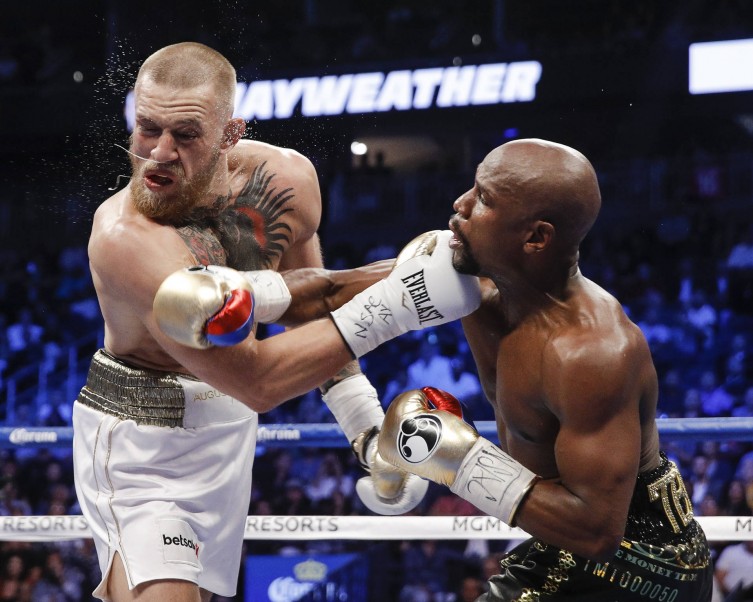
Esther Lin/Showtime
Everyone like it when the circus comes to town, with the exception of those who have to deal with the piles that the elephants leave behind.
In this monumental crossover event “Money” Floyd Mayweather Jr. (49-0, 27 KOs) performed a masterful interpretation of P.T. Barnum, barking the dangers and *risking his undefeated record by coming out of retirement to face off with Conor McGregor (0-0, 0 KOs) in his professional boxing debut.
While both were champions in fight sports, it was a clash of cultures nonetheless.
In a tale of two antagonists, McGregor was the extremely popular, vitriol spewing, charismatic MMA fighter with belts in an unprecedented two weight classes concurrently and an absolutely monstrous base of rabid, diehard supporters.
Mayweather has been a boxer since his early childhood, compiling an impressive amateur record of 84-8 which included a bronze medal in the 1996 Olympics in Atlanta and subsequently running the table 49 times in a row as a professional.
Over his career “Money” won nine world championships and established himself as the best fighter and trash talker of his generation, if not an all-time great, even branding himself with the moniker TBE or The Best Ever.
The show began on social media to get the temperature of the room and a short time later rumors of the matchup began to create a buzz, albeit separate ones between MMA fans and boxing purists.
McGregor’s presence in the octagon created such fierce loyalty with his fans that the powder keg of publicity exploded when the contract was signed to meet the boxing great.
While Mayweather also has a massive, loyal following the news was not met with nearly the same enthusiasm on boxing’s side of the tracks and was widely viewed as an uncompetitive money grab. It was also viewed as the proverbial train wreck, one that you watch out of morbid curiosity. “Yeah, but just imagine the press conference(s)…”
Enter the clowns…
There ultimately would be several press conferences that drew more spectators that many main events with media attention to match and the trash talk exceeded expectations, one would only hope the same would ring true for the fight.
McGregor appeared more competitive than anticipated in the first few rounds before being stopped in the 10th Round. Many spectators felt that Mayweather could have closed the show any time that he chose to do so, something “Money” himself stated in an interview a few months after the fight.
The unfortunate upside, for those involved in the event at least is that it was an astronomical finical success grossing over $700 million worldwide and netting Mayweather $300 million to McGregor’s $100 million.
A few pockets got lined while millions of others were fleeced, and this is not limited wholesale to the fans.
There are far more competitive matches that could have been made in place of aptly named “The Money Fight”, ones that would have provided much needed exposure to excellent fighters not known to the mainstream and infused credibility to the sport’s battered reputation.
The precedent has been set and other absurd potential matches have been floated, the most recent and disturbing of which being all-time great Manny Pacquiao against…yep, Conor McGregor.
It is not difficult to imagine that the next step could be an intergender boxing match. While that would seem truly ridiculous, not to mention dangerous it will happen should the numbers make sense to the *right people.
Picture Rhonda Rousey when she was undefeated and insanely popular v a mid-level club fighter with a cool story and nickname or worse, against a contender.
It’s a slippery slope and boxing has enough credibility issues with countless weight divisions, watered down championships, PPV greed, bad stoppages and ludicrous decisions, the last thing the sport needs is a multiplier to its distorted equasion.
Ringling closed the doors in 2017 and will participate in the circus world no longer, boxing should do the same.
..and someone get a shovel, those elephants made a mess.
Nigel Benn vs. Gerald McLellan 2-25-1995
If there was ever an example of a fight that had to happen and it’s unfortunate that it did, this is the one. It was a tragic result following the magnificent, beautiful brutality that only boxing can provide.
Gerald “The G-Man” McLellan (31-2, 29 KOs) had usurped the WBC middleweight championship by stopping fellow knockout artist Julian Jackson in five rounds two years prior. McLellan then defended his crown successfully three times, all first round knockouts, before turning his eyes to the super middleweight division.
At 6’0 tall and possessing a sturdy frame, a seamless transition was expected in the move and that McLellan would take his devastating power with him.
“The G-Man” immediately challenged the dominant super middleweight kingpin, U.K native Nigel Benn (39-2-1, 33 KOs) for his prized WBC belt and was installed as a 3-1 favorite.
What ensued on fight night was the manifestation of every reason that gladiatorial blood sports has filled arenas of all sizes with spectators howling their approval or lack thereof for centuries.
In this case it was The London Arena and packed to the rafters with supporters of the champion who came to urge hometown hero Benn on to his 7th successful title defense.
The rivals dispensed the notion of feeling each other out and attacked each other in the center of the ring, neither appearing to respect the others proven, crippling power and within 35 seconds Benn went through the ropes on his back, reminiscent of Marciano v Joe Louis, legs splayed and badly hurt.
Remarkably, the champion beat the count and stumbled drunkenly back between the ropes and into the ring.
Without hesitation McLellan unleashed Fire and Brimstone upon his wounded foe for the remainder of the three minutes and somehow survived the round.
Even more remarkably, ‘The Dark Destroyer” rebounded and shook the challenger several times, clearly winning Round 2.
The two fighters exchanged ferociously with the edge going to Benn until Round 8 when a distressed champion went to the canvas after throwing a wild left hook. The momentum of his punch coupled with exhaustion appeared to have more to do with the official knockdown than a specific punch however McLellan had been battering Benn throughout that stanza, a round that McLellan had never been beyond in his career.
In Round 10 McLellan came to the center of the ring to engage the champion he was blinking excessively. Shortly after he was caught with a crushing right hand, one of many he had handled throughout the grueling fight.
Benn followed up and the challenger uncharacteristically took a knee, still blinking but appearing lucid. He rose as the referee neared the end of his count and continued to fight.
Sensing an opportunity to end matters Benn continued the assault and McLellan again took a knee, remaining in that position until the full count had been tolled.
The crowd exploded its approval, understanding that an all-time great fight had unfolded in their presence and immediate celebration ensued.
An understandably elated Nigel Benn basked in the glory, loudly addressing his rabid fans and admonishing the media for doubting his chances.
Amidst the exaltation in the arena, McLellan quietly slumped to the canvas in the opposite corner.
Both fighters went directly to the nearby Royal London Hospital though Benn left the ring on his own power while McLellan was put in a neck brace, administered oxygen and removed on a stretcher.
Benn was hospitalized overnight with what was determined to be exhaustion from their epic encounter. Benn said “I came out of that fight with a damaged nose, a damaged jaw and I was urinating blood. I was in bed for three days afterwards and I had a shadow on my brain. That shows you how powerful a champion that man was.”
McLellan sadly was less fortunate.
The punishment left him with a huge, life threatening blood clot in his brain and underwent emergency surgery in an effort to save his life.
The surgery was successful but left him in a coma for two months. Upon awakening it was discovered that he was left blind, hearing impaired, brain damaged and relegated to a wheelchair for life.
Benn fought only five more times following his match with McLellan, losing three in a row before retiring.
Jerry Quarry vs. Ron Cranmer 10-30-1992
“Irish” Jerry Quarry was voted Sports Illustrated Most Popular Fighter in the World in 1968, quite a feat considering he competed in the Golden Age of Heavyweights.
When Quarry retired in 1977 he had complied an impressive resume of experience having engaged Muhammand Ali (twice), Ken Norton, Joe Frazier (twice), Jimmy Ellis, Ernie Shavers, Ron Lyle and Floyd Patterson (twice).
The only big name missing was George Foreman who wrote in his book By George “Jerry Quarry is the only man I ever ducked.” Ironically, it was Foreman’s improbable comeback success that was the inspiration for Quarry’s return in 1992.
Quarry could not be accused of ducking, especially in terms of punches doled out by his opponent.
His rugged, bulldozer style and iron chin made him a formidable opponent and left hook would keep him in the fight, regardless of the battering that he may have taken throughout the bout.
The excitement that he brought to the arena earned the charismatic fighter from California $2.1 million over his career and he earned every one of them.
Sadly, three ex-wives and years of drug and alcohol abuse had depleted his reserves, leaving the former title challenger to consider the inconsiderable despite signs of brain damage as early as 1982.
A neuropsychologist had cautioned that Quarry “…has the brain of an 80 year old and will be lucky to live ten more years.” Despite the warning the headstrong fighter accepted a match to take place at the Holiday Inn Trade Center in Aurora, CO where the formalities of medical clearance and boxing licensing would not interfere with a promoters ambitions.
It was artistically appropriate the fight was scheduled to take place the day before Halloween.
The 47 year old Quarry entered the ring with a record of 53-8-4 (32 KOs). His opponent was cruiserweight journeyman Ron Cranmer who boasted a 3-4-1 (2 KOs) compilation and was four years old when “Irish” Jerry had made his professional debut.
The battle worn veteran took a beating, was cut over both eyes and losing several teeth in route to losing a six round unanimous decision.
His paycheck was $1,050.
Following the fight Quarry’s brother said that Jerry was “gone” and for the remainder of his days he was confused, wore a blank, vacant look and needed help getting dressed.
Quarry was surviving on a $614 monthly Social Security check and no health insurance when his brother helped him wander on to center stage as he was inducted to the Boxing Hall of Fame in 1995, though he seemed fairly unaware of what was happening.
“Irish” Jerry Quarry passed away just six years after his final bout, the cause of death was determined to be Dememtia Pugilistica.
He was buried in Shafter, CA in the same cemetery as another brother, Bobby who died from the same affliction.
Roy Jones Jr. vs. Any Opponent After 3-1-2003
The great Roy Jones Jr. is very arguably the most naturally and athletically gifted fighter in the long, storied history of boxing.
In his prime, catching Jones clean was as likely as landing a haymaker on a wisp of smoke. He was, in a word, sublime.
In the 1988 Olympic Games in Seoul, South Korea Jones was ultimately presented the Silver Medal after cruising to the finals without losing a single round. The result was bitterly disappointing to the amateur stand-out following a blatant robbery and the Gold being awarded to South Korean Park-Si Hun who later apologized to Jones for the result.
Jones turned pro the following year, foregoing the standard four or six scheduled rounds and leapt directly into an eight round middleweight affair against Ricky Randall who he stopped in two rounds.
In just his 16th fight Jones faced off with tough former world champion Jorge Vaca in a scheduled 10 round affair. Jones barely broke a sweat, catching the veteran with a blinding counter left hook that dropped him for the count early in the first round and raising his record to 16-0 (16 KOs).
Four years after his professional debut Jones’ supersonic speed, devastating power, exciting low hand countering style and supernatural, cat-like reflexes propelled him to the big stage and a middleweight title shot.
His opponent was a prime future Hall of Famer and all-time great, Bernard “The Executioner” Hopkins. Jones emerged with the IBF middleweight championship via unanimous decision by three scores of 116-112. The Associated Press reported: “Jones was much too fast and much too strong for Bernard Hopkins.”
The following year Jones rose in weight to challenge reigning IBF super middleweight champion, James “Lights Out” Toney who was undefeated in 46 fights. Toney was another great and future Hall of Fame fighter. The defending champion was a top flight pound for pound fighter in the world and favoured to successfully repel Jones attempt at his title.
Jones slipped, countered and glided around Toney for the entire night and dropped him briefly in the third round with a dazzling, leaping left hook after mocking the champion. The result was never in question and Jones was declared the winner via decision by wide margins.
Jones defended his championship successfully six times all by knockout, including an easy, masterful dissection over the very popular and fan friendly Vinny Pazienza.
Moving up in weight yet again Jones slipped between the ropes against “The Body Snatcher” Mike McCallum for the WBC Light Heavyweight championship in Tampa, Florida. He pitched a shutout, winning every round and dropping McCallum in Round 10 in the process.
By this point in Jr.’s career even C.J Ross and Adelyde Byrd could see that we were witnessing something very special, a once every 4 generations kind of special with further proof of greatness to come.
In 1997 Jones suffered the first scuff on his perfect record in a defense of his light heavyweight against Montel Griffin. Jones had landed a combination against Griffin who took a knee in response. Jones fired off a left hook that put Griffin on his back and unable to continue resulting in Jones’ disqualification and losing his cherished championship belt.
Jones absolutely annihilated Griffin in the opening round of the rematch five months later, regaining the throne that Griffin had kept warm for him.
Jones Jr. subsequently reeled of an amazing thirteen successful title defences, none of them especially competitive. The champion was simply light years beyond any of his challengers and was virtually untouchable.
Not content being King of the light heavyweights Jones set his sights on the greatest title in sports, the heavyweight championship.
On 3-1-2003 Jones entered the ring at a rock solid 193 pounds and faced John “The Quiet Man” Ruiz for WBA world heavyweight championship in Las Vegas, Nevada. He defeated him handily by a wide decision to become the first former middleweight champion to win the heavyweight title since Bob Fitzsimmons in 1897.
Cue the inspirational music, artistic camera angles and fade away to the crowds howling adoration…
Only in the movies kid.
Antonio “The Magic Man” Tarver was the only top light heavyweight contender that Jones had yet to vanquish and had been vocally calling Jones to the carpet to defend his almost mythical status.
Unable to secure fights with Mike Tyson, Evander Holyfield or Lennox Lewis at heavyweight, Jones accepted Tarver’s challenge.
Jones struggled to lose eighteen pounds of muscle to drop back two weight classes to return to the 175 pound limit. It was later reported that just five days before his match with Tarver he was hovering at 183 pounds and looked gaunt as he tipped in at the limit at the weigh in.
Jones struggled during the fight and appeared uncharacteristically fatigued after only four rounds. Tarver gave Jones everything he could handle and Jones escaped with a majority decision victory.
Jones Jr. blamed his lackluster showing on his trouble making weight and signed for a rematch that would take place six months later.
When the fighters met in center ring for the instructions prior to the opening bell referee Jay Nady, following tradition asked if anyone had any question. Tarver replied “Yeah, I’ve got a question. You got any excuses tonight Roy?”
Jones, a 4-1 favorite had a good first round and appeared comfortable. In the second round “The Magic Man” pulled a rabbit out of his hat and landed a titanic left to Jones’ chin that completely disconnected him from his senses and sent him heavily to the canvas. He somehow rose at the count of nine but was clearly in no condition to continue and the fight was called to a halt.
In his next fight Jones was knocked out cold by Glenn Johnson and remained virtually still on the canvas for a scary three minutes as he received medical attention.
He lost two of his next five fights, dropping clear decisions to Antonio Tarver in the rubber match and Joe Calzaghe of Wales.
He picked up wins against two badly faded former contenders before being stopped in the very first round against Danny Green, decisioned by old rival Bernard Hopkins and brutally knocked out again, this time against Denis Lebedev in consecutive losses.
Jones fought a string of no hopers and cab drivers, putting together eight meaningless wins before being knocked out by Enzo Maccarinelli in 2015.
Sadly, the 48 year old Jones continues to fight on and in 2016 faced Vyron Phillips, a fighter making his debut in a six round match and later a bare knuckle fighter named Bobby Gunn, also putting pro boxing gloves on for the first time.
Bernard Hopkins vs. Joe Smith Jr. 12-17-2016
“Well, life has a funny way of sneaking up on you When you think everything’s okay and everything’s going right And life has a funny way of helping you out when You think everything’s gone wrong and everything blows up In your face”
Was Alanis Morissette a boxing prognosticator in addition to a talented lyricist and singer? She seems to have nailed it on this one.
This night was supposed to be boxing legend Bernard Hopkins’ farewell performance complete with balloons, confetti and fireworks.
There were fireworks all right…
The 51 year old warrior could have faced anyone as the curtain fell on his legendary career but he insisted on popular, heavy handed powerhouse Joe Smith Jr. (22-1, 19 Kos) who was coming off a career best win having destroyed top contender Andrezej Fonfara in the first round six months prior.
Hopkins had made a living proving the experts wrong…
Hopkins lost his professional debut, a virtual career death sentence in the sport’s current climate, and rebounded to win his next 21 fights in a row, 16 by stoppage and 12 of those coming in the first round.
It took a fellow boxing great and future Hall of Famer to break that streak when he was outpointed by Roy Jones Jr. over 12 rounds in 1993.
He would not meet defeat again until 2005 and 25 wins later that include stoppages of two more future Hall of Fame fighters, Oscar DeLaHoya and Felix Trinidad (as an underdog) and notched a historic record 20 successful defenses of his middleweight title.
Hopkins continued to upset the proverbial apple cart with upset wins over Winky Wright, future Hall of Famer Antonio Tarver and the undefeated Kelly Pavlik and later avenged his loss against Roy Jones Jr.
In 2011 Bernard became the oldest world champion in boxing history at 46 years old, annexing the light heavyweight title from the rugged Canadian Jean Pascal.
Three years later Hopkins ignored conventional wisdom and challenged the most feared light heavyweight in the world, Russian strongman and world champion Sergey “Krusher” Kovelov. This was particularly concerning as one of Kovelov’s opponents had died as a result of his irresistible power and Hopkins, though never stopped before was 49 years old.
Hopkins used every ounce of guile and experience during this fight and certainly provided Krusher with some lessons. In the end Kovelov was victorious via decision and boxing fans breathed a collective sigh of relief as Hopkins emerged relatively unscathed and smiling.
When 51 year old Hopkins announced his final fight it was met with relief and plenty of fanfare. No-one had earned their gold watch more and Hopkins could enjoy his time as a civilian working with promotional partner Golden Boy Productions and providing insightful commentary for big fights on HBO.
“An old man turned ninety-eight He won the lottery and died the next day It’s a black fly in your Chardonnay It’s a death row pardon two minutes too late Isn’t it ironic, don’t you think”
While Hopkins wasn’t ninety-eight he appeared to be so on fight night and Joe Smith Jr. was the black fly in his celebratory Chardonnay.
He had a few bright spots but the night came to a swift and conclusive end in Round 8 when Smith stunned to faded legend with a right hand.
He followed up with a sledgehammer, two handed attack that landed cleanly and knocked Hopkins out of the ring and on the arena floor below. Hopkins was unable to continue and the final verse was written.
Header photo by Esther Lin/Showtime



